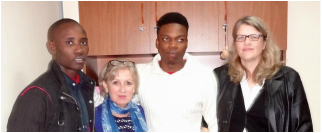 Crawford in the Republic of Georgia where she teaches students from a variety of backgrounds who come for training Crawford in the Republic of Georgia where she teaches students from a variety of backgrounds who come for training Kim Crawford has put her nursing skills to use in her home state of Georgia, as well as overseas. She explains what nurses need to know and how they are valued at home and abroad. Tell a little about yourself including what drew you to nursing as a profession. I grew up in Atlanta, Georgia next to the Center for Disease Control and Emory University. My father was a dental professor at Emory and he taught me when I was a young teenager about how the heart worked. After that I was hooked. I wanted to do something in the healthcare field. I looked at other healthcare professions including medicine and veterinary science, but wanted something, that when I graduated I could work and, that didn’t require any more school. At the time, I was a good student but did not enjoy school. I much preferred other things like sports or playing my cello to opening a book. I grew up in a house that always had other people over, whether friends from church or classmates. My mother volunteered a lot at our school and had been known to teach fellow classmates how to drive, or she would get supplies for their class projects since their families were usually single parent households. My parents had also traveled several times to Latin America to provide dental care in villages. We learned early on that we were to share our lives and our gifts with people around us regardless of whom they were or where they came from. Seeing people as people and equals regardless of where they are in the world set my path to nursing long before I had even thought of it. I was a pediatric emergency room nurse for 12 years and did many short-term trips to various countries for teaching as well as providing disaster response. Somehow I ended up here in Tbilisi about five years ago doing continuing education for nurses, many of whom had never had it. This led to my current job as a professor of nursing and public health at a private university in Tbilisi, Georgia. What is your greatest emphasis when you are teaching nursing students from other cultures? Are there things that you have to focus on that are different from teaching U.S. nursing students? Since I teach in the country of Georgia and not the State of Georgia, there are many, many differences. The textbooks that we use are from the U.S. or U.K. and some of the content is not relevant to my Nigerian students. There is a lot of explaining regarding some of the anecdotes or cultural assumptions that are written in the literature to make relevant to my students and to the Georgian Healthcare System. Different aspects such as electronic charting, certain insurance schematic types, and even types of equipment used from intravenous pumps to bandages have to be explained knowing that they may not be working in that environment. I take the approach that I will teach them from a western perspective as well as from a current resources available basis. It teaches them to be flexible and possibility be innovators in the community in which they will work. In addition there is an emphasis on respecting other cultures that often times they are not taught to the level Americans are taught in school. Providing cultural care that involves learning and respecting the differences in all people one comes in contact with. Most students, both Georgian and Nigerian, have limited skills in this area due to living in homogenous environments and have had limited exposure to other cultures. What are the biggest cultural differences you've encountered when it comes to what is expected of nurses including training and demeanor? In the country of Georgia, nurses are almost at the level of the maintenance staff. They are not considered a respectable or valued profession as they are in other countries. Up until a few years ago, nurses were not even considered to have a professional level of education. To come from a culture where nurses are more trusted than physicians, developing and implementing a baccalaureate nursing program has made for a very daunting task. Promoting nursing as a profession has become one of my most important tasks. We are in our final semester of our first cohort of students and each semester has brought along unforeseen challenges from making sure that we have documentation for the students to showing up to clinical lessons and class on time, to the skills of being able to write a term paper. This is in addition to just working through a regular nursing curriculum. Developing a level of accountability, objectiveness and even attempting to improve quality has been the most exhausting process. Throw in the different dimensions of superiority and respect based on age or job title or even just saying what is expected to be said rather than the reality and it is a very different ballgame than the US. How has nursing changed over the years in the U.S. and in the places you've been, if at all? Nursing in the States has become much more autonomous and patient-centered while promoting a climate of safety and prevention. This is to the point where we don’t realize that we are doing this until we move to another culture and realize that these basic principles don’t exist. Nurses have so much autonomy and are able to truly empower the people they come in contact with. In Georgia, I have seen nursing go from no one even knows what to call them (really!) to seeing nurses grow in their solidarity and hear people say that they need better trained nurses. So at least nursing is on the radar of hospital administrators and policy makers though a small blip. The nurses that I have trained in continuing education in Georgia, I have seen a change in their demeanor. They are more encouraged and empowered than five years ago. Are there a couple of situations through practicing nursing or teaching that have really stuck with you, either good or bad that you could talk about? I didn’t know how much I loved my profession until I started teaching it in other countries. I always loved my job as a Pediatric Emergency Room Nurse. There was always an adventure just around the corner. But when I went into worlds unknown whether it was for disaster response or coming to Georgia and teaching those who had been nurses for 20 years but had never had a continuing education course, my love grew. A couple of situations still come to mind. While in Sri Lanka, after the Tsunami that hit in 2004, I was working in a refugee camp in a makeshift clinic made up of a few tents and other volunteers like me who were there for a few weeks to just fill in with basic medical care since all of the local clinics and hospitals were either destroyed or overwhelmed by this tragedy. We had had busy days of seeing patients and had eaten dinner, played a little soccer with the local children and were about to head to our sleeping bags and camping mats when we heard a cry from some locals. They were bringing in a man who had been in a motorcycle accident. I cannot remember if he had been hit with a motorcycle or had been the one driving it when he was injured. In addition, he had the smell of alcohol on his breath. Most of us were Americans in this clinic and we all knew what the other was thinking, “This man is a drunk.” One of the physicians was an emergency room doctor. We both knew what to do and worked as though we had worked together for years. That is the exciting part of having such a well-trained system in the US; it builds for well-trained teams when put together outside of the US. This man had burns on his legs and hands and abrasions and lacerations on his head and arms. We worked on him by flashlight for two or three hours. We didn’t need to give much pain medication since the alcohol’s sedative effects had kicked in; though we did wish we had breath mints for the patient. We found out later that this man had lost his entire immediate family in the tsunami. He was grieving the best way he knew how and probably had a death wish as well. There were no lights except by the moon that was covered by clouds and he was heading to a friend’s place for the evening. We were able to clean his wounds, give him a place to sleep for the night and provide antibiotics; all things that had we not been there, at the very least, he would have lost a limb or two. Another instance that comes to mind is of a student of mine here in Georgia. This student walked in the first day of simulation laboratory late and did not seem to have a clue and I thought: there is no way this guy is going to make it. But slowly, he changed, matured, grew not only as a nurse but as a person. This past summer he volunteered at a children’s hospital all summer. He is also starting an international nursing club here in Georgia. He is always the first to volunteer for any medial task that the dean needs help with. He has grown into a man of convictions and service. He doesn’t seem to have the social fears that one would have when moving to a new country. His grades continue to be average, but being able to witness the transformation of a boy becoming a man has far surpassed the importance of any grade. I feel honored that I have been able to be a part of this transformation. I love to teach and I love nursing. It is one of the few places I don’t have to be judgmental. I just have to care and be consistent. I can grieve with those who are grieving, provide a bit of relief even if only temporary to those who are hurting. I can teach and model what a western nurse looks like without all the fancy uniforms, gadgets and even paychecks. I can practice and teach what I love. Where would you like nursing as a profession to be in 10 years. What about you in 10 years? I hope nursing continues to grow as a profession here in Georgia, where nurses become a profession with autonomy, critical thinking skills and patient educators. In the west, I hope that nursing turns not only to those patients in the U.S. but that there is a bigger focus building up the nursing profession in other countries. Nurses empowering nurses, all from different cultures and backgrounds. In the U.S., we are too caught up on benefits and paychecks that we miss the much bigger blessing of reaching out to others who don’t have the same benefits and paychecks we do. The real reward and blessing lies in investing our time, skills and energy in those who do not have those resources. Initially we think that we will be able to make a big difference, but in the end it is we who are changed. I am not sure what would happen in the U.S. if or when I return to teach. I am not the same person as I was five years ago. I am starting my PhD to continue my education so that I can learn how to better educate others. I hope in 10 years I am in a university that values education over money, looks at the nursing profession as one of the greatest potential life changers of the 21st century for the developing world, and that my passport is always close at hand. Interview By Suzette McLoone Lohmeyer
0 Comments
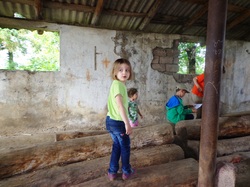 Playing in an old shed where tea used to be dried. Playing in an old shed where tea used to be dried. A few weeks ago my children and I were invited to stay on a remote farm in the Western countryside of the Republic of Georgia. We are moving back to the U.S. in a few weeks, and a trip outside the city sounded like a good way to escape the stress of packing, planning, organizing and saying the many goodbyes that take a toll on children and adults alike. We set off late morning (no Georgian does anything before 10am – a strict no rush policy I have come to appreciate) and drove down the highway that eventually turned into windy mountain roads, then down along the seaside, until we reached a narrow gravel road that led to a tiny village of houses high on a hill. It was an old tea plantation during Soviet rule, with acres and acres of tea. But now just a few sprigs of tea popped up here and there pushed up against weeds and wild blackberry bushes. A large gate opened at the end of the road, and our host immediately apologized for the state of the house, although it looked to be one of the better ones in the neighborhood. It was her parent’s house – the place where she was born and raised. They were doing a few renovations and there currently was no electricity or water. She politely showed me to the outhouse, next to the chicken coop and provided a bucket in case the children or I needed to go in the night (much too dark to try to make it to the outhouse after 9). And I was instructed on how to use the well if I needed water for tea or cooking, and proudly shown a bucket of frothy fresh milk from the cow. I nodded politely. My host spoke no English – only German and Georgian. And her parents just Georgian. And my German, while I call it conversational, is tragic at best. 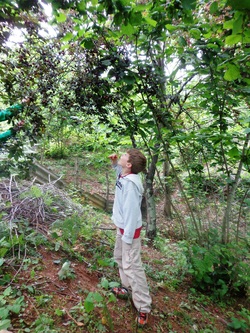 Snacking on fruit straight from the tree. Snacking on fruit straight from the tree. After the tour I felt every bone tense. The children had run off into the woods to goodness knows where, the well was poorly covered, the milk I was being offered was straight from a cow who was still mooing for the milking to continue, and I could actually see the fleas hopping off the black, friendly dog rubbing against my right leg. The chicken pecking at my left shoe was the least of my problems. For dinner we ate khachapuri – a traditional Georgian pastry of bread and cheese. It had a different taste – so fresh and warm and unlike what we order at the Georgian restaurants back to the capital city of Tbilisi, where we live. Wine in plastic water bottles was served and tasted better than anything I had in a bottle. With a little help from the wine, I started to relax and look around. Everything was simple, happy, and fresh. It was 11 or 12pm, but Georgian children stay up as late as they like, and neighbors wandered in and out wearing bathrobes and slippers with babies and children to chat and drink wine or tea. In the morning the kids were fine despite a lack of sleep - energetic even – off in the woods in their pajamas collecting fruit and eggs, and helping the grandmother milk the cow. By the second day, the children and I had mastered the outhouse and the bucket. And although hand washing wasn’t easy we managed with a bucket of well water and promptly gave up on showering altogether (we did get one shower in at a kind neighbor’s). I even relaxed about the kittens nibbling on any leftovers in the kitchen that would inevitably be nibbled on later by children and then the kittens again and then possibly the dog or the rooster if either could manage to get in the house. On the third day, I let go. Anyone who has been able to escape modern civilization knows this feeling. It isn’t the same feeling that you get when you go to a spa or a vacation home at the beach – places you have everything you need and the time to use it. This was about letting go of all those things you think you need. The kids had rosy cheeks, running noses, skinned knees and their clothes were absolutely filthy. At one point I found them completely covered in mud in a pig pen playing with tiny piglets. They ran through the streets freely to neighbors houses and through fields. 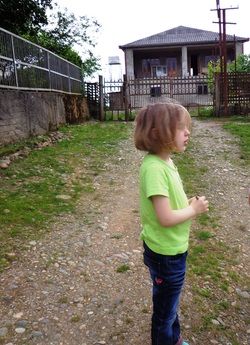 The old farmhouse where we stayed. The old farmhouse where we stayed. The cows strolling down the streets were lazy and beautiful. If I was looking for the kids I would often find them in the old tea house where they used to dry the tea. Now it is a gathering place for children to practice the latest dance moves or chase each other with sticks. The local girls showed us Georgian dance and something that went along with a Katy Perry song. The grandfather who spoke no English gathered fruit and vegetables and presented them to me – so proud they were his own and begging us to return to September when the rest of the fruit was ripe. We met with neighbors who had known each other for generations and each with a story more interesting than the next. I am not saying it was an easy 4 days. I could never quite get over the fleas and the first thing I did when we returned was scrub everyone down from top to toe. But it was a form of meditation that I had not experienced since I was a child. We’re back in Tbilisi now and packing, organizing and going to goodbye parties. We have no furniture and we can’t find anything we need when we need it; and each day seems to be met with a new sort of chaos as we move from one life to another. But our weekend away made us realize we don’t need much. The bowl I am so attached to and the set of sheets I love, or those candleholders that I chose so carefully at the bazaar – none of it really matters. And if it gets lost in the shipment or breaks, it will be fine. Frankly, a little time away makes you appreciate that all that stuff is just stuff. Although I do still find running water exciting even after a few weeks back in the city. By Suzette McLoone Lohmeyer 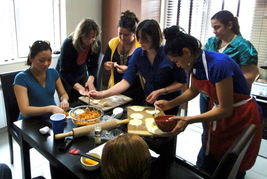 I am in my last two months living overseas, and am without a doubt focused on food and cooking, which is much easier than organizing and packing. While part of me is thrilled to go back to convenience foods and take-out, I fear I will lose the ritual of cooking that has become key to building relationships and learning to deal with what is in front of me. I spend hours with friends wandering the fruit and vegetable stands buying whatever is in season, and going home and calling those same friends to find out what meal they are preparing with what we found. Sometimes we’re faced with eggplant for weeks, and then that will be gone with cabbage in its place. As part of an expat community where people come from many different countries, the recipes we trade are often wildly different. These dishes would sometimes delight, sometimes shock, and once in a while disgust my family (think carrot and broccoli pizza with mayonnaise). I knew an expat cooking club existed here in Tbilisi, and even have a few friends that are part of it; but the thought of cooking for fun sounded exhausting (the process already takes so long!) so I never joined. But in my last couple of months here, I am starting to look at things I once passed by - museums, little stores I’ve always wanted to go into, and activities I never tried. After talking with some of the members, I found that the cooking club is an organized version of the cooking ritual that I had been using to deal with being a stranger in a strange land: a reason to get together, develop friendships, and a lesson on how to deal with what you have, instead of what you’re used to. Only in this group, they have much better food. 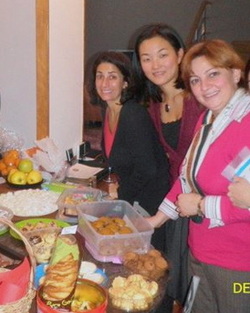 For Amy Austermiller, an American who has lived overseas for the past 14 years, cooking club is like being at an old friend’s house, a feeling that most expats don’t get to experience often because best friends are usually across the globe. “Old members jump right into a meeting at someone’s house - taking out pots, looking for knives and just chatting away as we receive directions and catch up on all topics Tbilisi. There is always such a sense of community when you cook and then sit down to eat together.” Other members find that it is a good way to share part of yourself with people you may not know well through food you cook. Naira Delphia, another seasoned expat and from Armenia, identifies the food people make by the person who made it. “Funny thing is if I got a recipe from a certain person, we call it with their name, e.g. Michelle’s salmon, Amy’s pumpkin roll or Marta’s cake.” And while Delphia often uses the recipes she learns at home, the club is more about being with people who can have a good time together over a shared interest. “It’s not important to me how much we cooked and ate, as long as we had fun cooking.” Coming together over food, also gives people a way to find similarities in cultures that might start friendships. Ethel Tohver, from Estonia, says she found there are as many similarities as differences. “There are no bad experiences in cooking club. Plenty of interesting and different experiences, like horsemeat, but at the same time as many experiences where you recognize that we are not so different.” For Michelle Der Ohanesian, an Armenian-American, it is a flashback to the cultural value of food that her father taught her years earlier and the family-style atmosphere that makes it feel homey. “When my Armenian father retired and started cooking dishes from the home country I began to understand how cooking can be cultural. It's been great to be here and in fact have Armenian ladies in the cooking group to see how some familiar dishes are made in context. You really see how cooking and culture are intertwined in these meetings.” 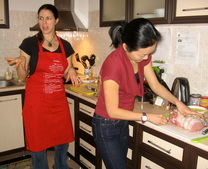 But what Der Ohanesian likes most is how it all happens so naturally, like a family when actual family is far away. “What I like best is the easy, casual style we have. I don't know how it worked out this way, perhaps it's because we all love food and cooking but we just all get along. We chat, we randomly wander into the kitchen to help chop or clean dishes; we move on to munch on something. It's hard to describe. It's organic. It's unplanned.” For expats, or really anyone who lives away from their home, these make-shift family and friend opportunities are key to survival, whether it is cooking club or hiking group or a regular happy hour. I’ve made many good friends that I probably never would have even had a second coffee with if I had been in my comfort zone. But you need each other, and so you take the time to find something in common. And by developing rituals together, you find a way to connect with each other and the place you’re in. By Suzette McLoone Lohmeyer 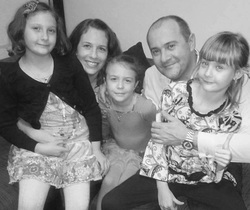 Stephanie and Nika with their three girls. Stephanie and Nika with their three girls. In 2006, Colorado native Stephanie Chachkiani, her triplet infant girls, her husband, and three of everything a baby might need, boarded a plane for a new life in the Republic of Georgia – a former Soviet country with a set of traditional values for women that Stephanie has found makes raising girls easier in some ways and a challenge in others. Sofia, Makayla, and Lucia, now 8, are heading for the tween years in a strongly orthodox culture that expects girls to remain virgins until marriage, marry young, raise and care for children and sick family members, and perform all domestic chores, while sometimes holding jobs. And like in most patriarchal societies, the social and religious doctrines set in Georgia expect a woman to “Obey man, behave as he wishes and place her own wishes and demands second,” according to a report on gender in Georgia by UN Women released last year. The same report also noted that men are generally “more free” than women when it comes to moral standards and a social life. “It is acceptable for men to be in the street at night, whereas similar behaviour is less acceptable for women. It is common for men to have an active social life (for instance, frequent and lengthy feasts), while similar behaviour by women might cause negative comments in the community toward her. It is considered that men unlike women are ‘forgiven’ for more. For instance, society is more tolerant of men cheating, whereas women cheating on men is unacceptable.” While in Georgia’s capital city, Tbilisi (where Stephanie and her family live), women are working, driving, and hanging out with friends, the ideal of the traditional Georgian woman does not always parallel how Stephanie wants her girls treated. She explained, “I do not think that as a whole, women in Georgia are valued for all that they are and do. They are very sacrificial and many of them do not get the respect and appreciation they deserve, especially from the men in their lives. I think they are often taken for granted and held to a different and much higher moral standard than men, often without complaint as that is just the way things have always been.” 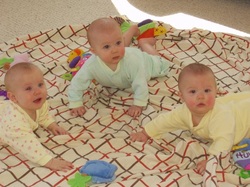 Makayla, Sofia, and Lucia before they moved. Makayla, Sofia, and Lucia before they moved. But for Stephanie and Nika - Stephanie’s husband and a Georgian national - the good outweighs the bad when it comes to girls growing up in Tbilisi. Sometimes, Stephanie says, those traditional Georgian values actually make raising girls there easier for them. “Because Georgia is so traditional and girls are expected to be so well behaved or have high moral standards, I actually feel more at ease raising girls in this culture. While, of course, we as parents try to instill high moral standards, values and self-respect in our girls, we all know that society can also play a big role in shaping the life of a person. So, I feel blessed that our girls are able to be raised in such an environment,” Stephanie explains. She also believes that America hasn’t solved the problem of how to raise strong girls either. “As for women in America, I feel, much to our own fault, women are objectified so much on television, the internet and on the streets that says, ‘Look at my body before you get to know me.’ I feel it should be the opposite and I think we are doing a serious harm to our girls when we allow them to think it is okay to dress provocatively. Our bodies are a beautiful gift that should not be shared with the entire world. We can look pretty, even sexy, without having to bare ourselves. That, to me, is sexy!” For Stephanie and Nika, life in Georgia with triplet girls is something they knew they wanted early on. The support system provided by Nika’s family, the way children are received with ease in restaurants and other public places, the affordability of childcare and daily life, and the good aspects of living in an orthodox culture, they explained, made it the best decision for their family. 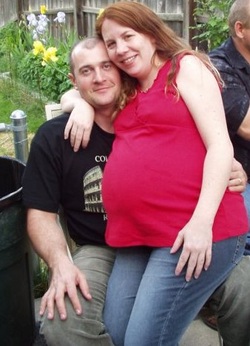 Stephanie, 6 months pregnant with her triplets. Stephanie, 6 months pregnant with her triplets. “We always knew that we wanted to raise our children here as Georgia is a very warm culture, especially toward children. The fact that we had triplet infants was motivation for us to move here sooner than later, especially because we could afford to have a fulltime nanny help out.” Nika added that there is less helicopter parenting in Georgia, giving kids more space to create strong friendships – something he wants his girls to experience. “I definitely feel that it is a lot safer for my kids to play outside here, compared to the U.S. We don't have to watch over them as hawks from our windows. And I think kids hang out with each other more and become closer friends. Relationships mean a lot in Georgia and I want my kids to grow up surrounded by them and understand their value.” Stephanie said the cultural divide is easier because she and Nika have a more American marriage than traditional Georgian. They spent time before they married getting to know one another at Colorado Christian University where they met – and now work as a team instead of in predetermined roles. “I would say that our marriage definitely follows what would be seen as the typical American norm. In Georgia, often the husband and wife marry early and therefore, do not get a chance to really know and fall in love with and respect one another. From there, they follow the traditional family roles of moving in with the husband's family, and quickly becoming pregnant, the wife stays at home, while the husband works.” Still, Nika said, they do sometimes clash over the smaller things in daily life that they attribute to being raised in different countries. At mealtimes, he said, food that is “normal and tasty to him” might not be to Stephanie. This sometimes influences how the girls feel about certain foods, which can lead to a larger discussion of what should be normal in their house. “There are times when these disagreements lead to conflicts, because we both think that we are right and none of us want to change our opinion and give in. I guess we just need to be more considerate of each other.” But when it comes to raising confident girls, who can make their own life choices, Stephanie says she and Nika are a team and have set their own rules even though Georgia might not be quite on the same page. “An ideal woman for me is a woman who is truly happy in her life, no matter the life she leads/chooses. For some, that may be the stay at home mom who dotes on her husband and children. For others, it may be the independent career woman. I believe that a woman (any person) should be able to live the life he/she chooses. That ideal may not be acceptable or understood by many in this culture, but it is understood by enough to make me feel free to be who I am here. For the rest, I simply don't have the time to care what they might think. This attitude in itself (not living to please or impress others) is not typical for Georgia, but that is slowly changing with time as well and I think it is healthy to have a balance of both. Live a moral life that makes you happy so long as it doesn't harm others around you.” For now, Stephanie says, the girls are thriving and don’t seem bound by the traditional roles around them. When asked what they want to be when they grow up, Lucia replied an artist and a singer, Sofia said she wants to own a bakery where she does her own baking (and possibly also sing and dance), and Makayla wants to be a spy, a forensic scientist, or a clown. By Suzette McLoone Lohmeyer |
Archives
June 2017
Categories
All
|
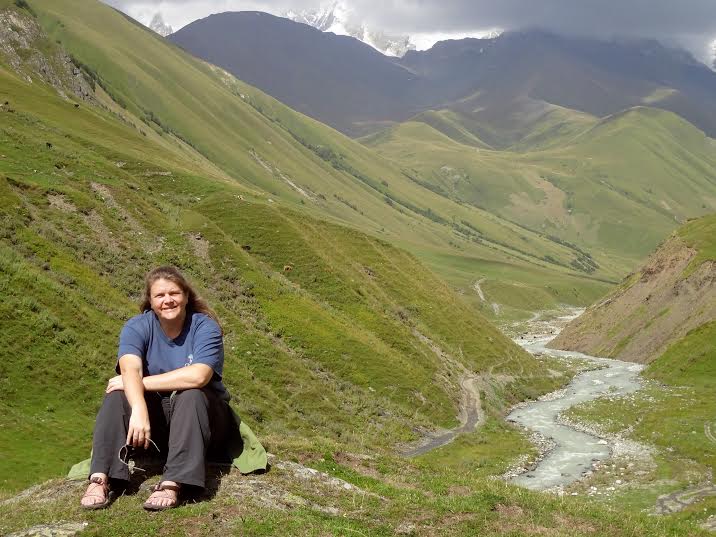
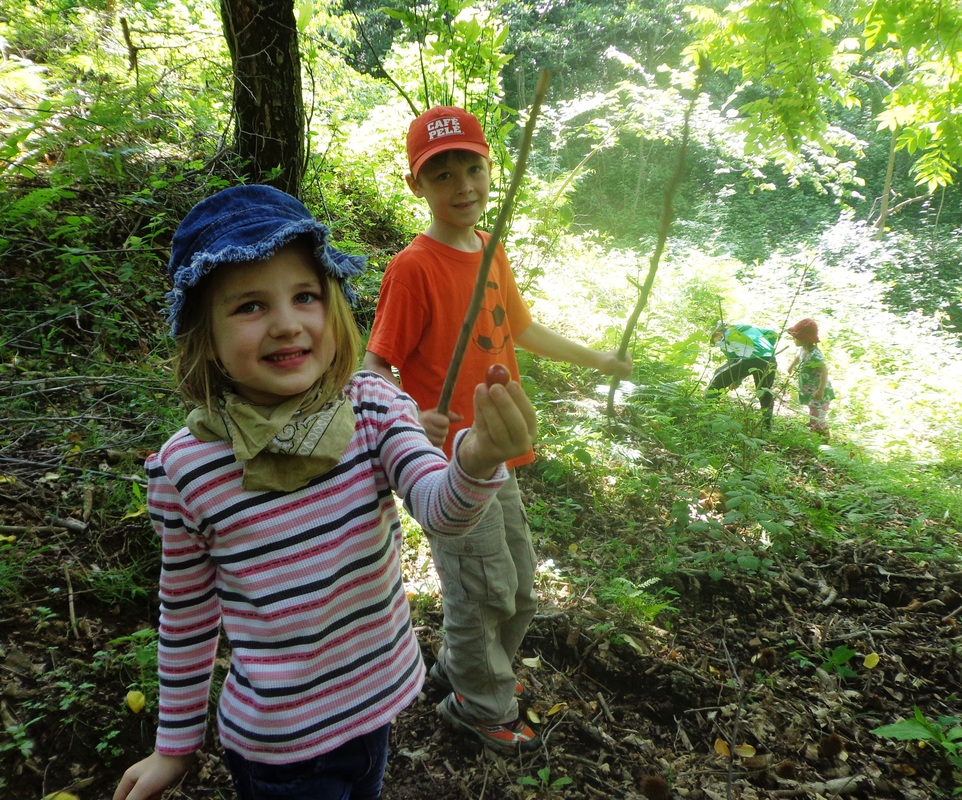
 RSS Feed
RSS Feed